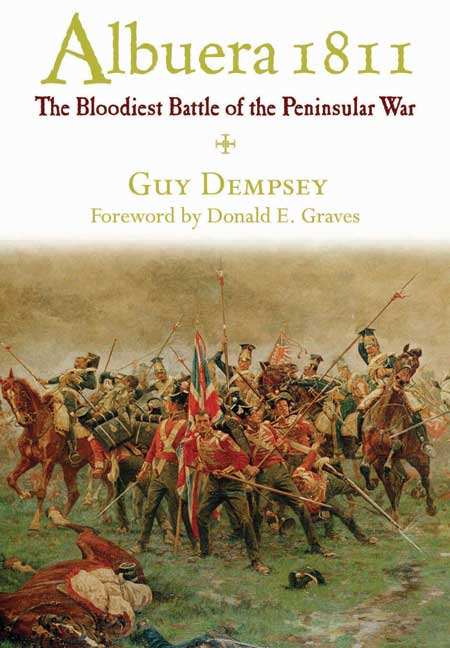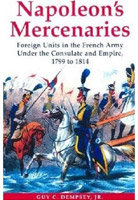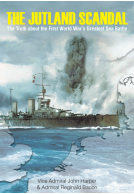Albuera 1811 (ePub)
The Bloodiest Battle of the Peninsular War

File Size: 17.3 MB (.epub)
Pages: 336
Illustrations: 16 colour & 32 black and white illustrations
ISBN: 9781783468904
Published: 17th April 2008
On 16 May 1811, the small town of Albuera was the setting for one of the Peninsular War's most bloody and desperate battles. A combined Spanish, British and Portuguese force of more than 30,000 men, under the command of Lord Beresford, stubbornly blocked the march of the French field marshal Soult, who was trying to reach the fortress of Badajoz, 12 miles north. Beresford, who defended himself with his bare hands against a Polish lancer, was victorious, but at the cost of 6,000 Allied deaths and 7,000 French in just four hours. The battle is best known for the Fusilier Brigade's charge, made famous by Sir William Napier's melodramatic description, and because of the tenacity of the 57th Foot that earned them the 'Die Hards' nickname. The battle has not been seriously studied since Sir Charles Oman and Sir John Fortescue's histories early in the 20th century - accounts which are incomplete and sometimes simply incorrect. This compelling new book fills this gap by using authentic primary sources to tell the story of the battle as completely as possible and dispels long-standing myths. The book also brings to life the human dimension of the story by using first-person recollections to describe experiences on and off the battlefield. The battle's drama is intensified by the circumstances of the fighting, which led to extremes of behaviour ranging from incomprehensible valour to rank cowardice. The book balances the traditional Anglocentric bias by paying equal attention to Spanish, Portuguese, French, Polish and German soldiers who fought there.
A truly great study of one of the most interesting and hard-fought battles of the Peninsular War.
The Society for Army Historical Research 2015 Christmas Book List
I have just finished reading one of the best accounts of a Peninsular War battle that I have read for some time. The book in question was; Albuera 1811: The Bloodiest Battle of the Peninsular War by Guy C. Dempsey.
Amazon
The battle of Albuera is known to Napoleonic historians and enthusiasts as one of the Peninsular War's bloodiest clashes and has provided history with such dramatic accounts of the British 57th Foot, forever after known as the “Die Hards”, and Napoleon’s Polish Lancers.
The book is easy to read and well told, without any national bias cluttering up the story. The narrative is supported with copious notes, showing the depth of research. Mr Dempsey offers reasoned analysis not only on the tactics, manoeuvres and the leadership of the commanders but also on the sources used in his study.
The book covers not only the strategic situation in Spain leading to this battle, the movements to the village of Albuera, the subsequent battle but also what happened after the fighting ended; the casualties (wounded and dead), the prisoners and the years of controversy and debate on certain aspects of this battle and its outcome.
The author makes excellent use of numerous first-hand accounts from both sides to give the reader an insight into the men involved in this costly battle and certain aspects of Napoleonic warfare. Like this account in regards to the accuracy of muskets and the main reason for massed volleys:
"One British officer famously summarised the abysmal qualities of his own army’s weaponry in the following terms:
A soldier’s musket, if not exceedingly ill-bored, and very crooked, as many are, will strike the figure of a man at 80 yards; it may even at a hundred, but a soldier must be very unfortunate indeed who shall be wounded by a common musket at 150 yards, PROVIDED HIS ANTAGONIST AIMS AT HIM; and as to firing at a man 200 yards [off] with a common musket, you may as well fire at the moon and have the same hopes of hitting your object. I do maintain, and will prove, whenever called on, that NO MAN WAS EVER KILLED AT TWO HUNDRED YARDS by a common soldier’s musket, BY THE PERSON WHO AIMED AT HIM."
Here is another first-hand account of an incident regarding the many wounded being transported after the battle at Albuera:
“One pair of wretches I particularly remember, an Irishman and a Frenchman, who travelled in the same car, both of whom had lost their legs – not partially, but entirely – and who yet ceased not to abuse and revile one another from morning to night. It was melancholy to hear them railing, in their respective tongues, and threatening one another."
The author mentioned how the casualty list for the British killed in the battle was released to the newspapers, only numbers of killed by rank, no names for NCO’s and privates:
“The casualty figures for Albuera were so gruesome that they were shocking to even casual readers of the press. Jane Austin had a reaction that was simultaneously both sensitive and somewhat callous: ‘How horrible it is to have so many people killed! And what a blessing that one cares for none of them!’”
There are a number of decent maps to follow the relevant actions and a large number of appendices providing information on a range of subjects of interest. This book has inspired me to start reading the full set of Sir Charles Oman’s history of the Peninsular War. If anyone is looking for a great battle narrative then I don’t think you will go too far wrong with this book.
Superb detailed account of the campaign before the battle
Amazon 5* Review
The battle itself
And the abortive siege of Badajoz afterwords (the follow up).
One of the most detailed accounts of battalion/regimental level fighting I have read in the Napoleonic era.
Dispels many myths.
Excellent maps .. and once you have read it you will know exactly
what happened in each gory phase of this sanguine encounter.
Top book
A superb outline of the course of a major battle of the Napoleonic wars which neatly brings some of the tactical complexity. It is well researched and goes into much detail. It gives sufficient context to understand how the battle came to take place - although perhaps a little more either side could have been provided. It is also written with a strongly British narrative - not in a biased sense, but simply that most of the individual and regimental stories told are British. The appendices are truly invaluable for anyone researching the battle with detailed orders of battle, casualty, and uniform details. Overall an excellent book.
Amazon 5* Review
The battle of Albuera was the most costly battle of the entire Peninsula War, and the subject of endless controversy at the time and since. This book looks at the wider campaign, the battle itself, the fate of the dead and wounded and that controversy.The account of the battle manages to be both detailed and easy to follow, quite a rare achievement. One of the most impressive features of this book is the amount of detail on the fate of the wounded and dead of the battle. Many accounts of battles mention casualty figures without going into any more detail, but here we see the surgeons at work for the lucky or the lingering fate of the unlucky. Dempsey also looks at the fate of the dead and their dependents, again not a pretty picture. This is a very high quality account of an infamous Napoleonic battle, and of great value to both the Napoleonic enthusiast and the general reader.
History of War
This is a fine example of how military-history books should be written. Guy Dempsey has produced a factual, balanced account of Albuera that is written in engaging and interesting prose.
Avon Napoleonic Fellowship
Full review at: http://avonnapoleonicfellowship.blogspot.com.au/2012/03/engaging-book-from-cover-to-cover.html
This is one of the finest tactical analysis of a battle I have ever read for any war or period in history. The author is able to impart an amazing amount of knowledge without ever bogging down in minutia. The reader feels as if they were truly there. I highly recommend this book, one of the best I have read in a long time
Customer reveiw
Guy C Dempsey's meticulous research has resulted in an excellent and very readable study into campaign and battle.
Militray Illustrated
I bought this book because I lacked a detailed level of understanding of this theatre of operations (in Spanish Extremadura), in general, and this battle in particular. I have not been disappointed. As a single volume work, covering a specific campaign and battle it is, without doubt, one of the best published in a long time. It is not an introductory text by any means: but the language used in the work, and the level of detail provided, will meet the needs of both the specialist historian and history 'buff' alike - for a long time to come.
The Napoleon Series
Guy Dempsey has succeeded in writing a clear and intelligent history of the battle. His use of primary sources in English, French and Spanish is refreshing, and quite important. Although Dempsey is not an academic—hardly a requirement for writing good history—he does not succumb to the all too common
H-France Review
hagiographic narratives of Anglophile or Francophile Napoleonic historians, either lauding Wellington or Napoleon's 'genius' as can often be the case among some historians. He understands the historical process, and the importance of qualifying sources. He also has a solid grasp of the historiography and provides textual footnotes when appropriate to place his interpretation within these debates. Dempsey is not new to Napoleonic military history, having previously published Napoleon's Mercenaries, for Greenhill Press. He spends the first three chapters providing the strategic context for the events of
1810-11, critical to understanding the battle; then seven chapters on the battle itself. It is quite easy for any historical narrative to become bogged down in detail, yet Dempsey avoids this pitfall, integrating personal recollections with analysis of actions to create a flow that is informative and cogent. Maps,
tables and charts provide further clarification when the discussion becomes more involved. The final chapters examine the aftermath of battle. When the drums and bugles ceased, the caring for wounded and prisoners along with the dealing with dead are addressed. What one finds is that Dempsey is part
of a trend in military history to reclaim, or reintroduce traditional military history—maligned by many, including revisionist military historians for too long- by not concluding the history with ground taken and glory attained, but by providing a human face in the sense of a comprehensive examination of the battlefield, before, during and after the even, carnage and all.
Guy Dempsey's account provides what surely must rank as the definitive history of British involvement in the Battle of Albuera. His opening four chapters succinctly relate the events preceding the battle and outline the battle's context. The next five, the core of the book, are devoted to a detailed account of the battle, followed by six chapters that consider its aftermath.
Journal of Military History
For sheer detail and the use of accounts from all participants, this book cannot be surpassed. Guy Dempsey has written a fine study of this battle, which would be difficult to improve upon. Any library on the Peninsular War should have Albuera 1811 on its shelves.
First Empire
Excellent book! Having walked the battlefield back in 1988, I wish I was able to have this book with me, as it would have enhanced my trip. Tells the stories of Commanding Generals to the lowest Private very well. Statistical information and informative stories at the end are what I would call "frosting on the cake". If you want a great book on the Napoleonic Wars, this is it.
History Book Club Website (US) Reviewer: Scott L
This is one of the finest tactical analysis of a battle I have ever read for any war or period in history. The author is able to impart an amazing amount of knowlege without ever bogging down in minutia. The reader feels as if they were truely there. I hgihly recommend this book, one of the best I have read in a long time.
History Book Club Website (US), Reviewer: Richard H
This is one of the finest tactical analysis of a battle I have ever read for any war or period in history. The author is able to impart an amazing amount of knowlege without ever bogging down in minutia. The reader feels as if they were truely there. I highly recommend this book, one of the best I have read in a long time.
History Book Club Website (US), Reviewer: Richard H
Excellent book! Having walked the battlefield back in 1988, I wish I was able to have this book with me, as it would have enhanced my trip. Tells the stories of Commanding Generals to the lowest Private very well. Statistical information and informative stories at the end are what I would call "frosting on the cake". If you want a great book on the Napoleonic Wars, this is it.
History Book Club Website (US) Reviewer: Scott L
For sheer detail and the use of accounts from all participants, this book cannot be surpassed. Guy Dempsey has written a fine study of this battle, which would be difficult to improve upon. Any library on the Peninsular War should have Albuera 1811 on its shelves.
First Empire - Dec 2008
Guy Dempsey’s account provides what surely must rank as the definitive history of British involvement in the Battle of Albuera. His opening four chapters succinctly relate the events preceding the battle and outline the battle’s context. The next five, the core of the book, are devoted to a detailed account of the battle,
Journal of Military History; April 2009, Vol. 73 Issue 2
followed by six chapters that consider its aftermath.
Guy Dempsey has succeeded in writing a clear and intelligent history of the battle. His use of primary sources in English, French and Spanish is refreshing, and quite important. Although Dempsey is not an academic—hardly a requirement for writing good history—he does not succumb to the all too common
H-France Review (No 9)
hagiographic narratives of Anglophile or Francophile Napoleonic historians, either lauding Wellington or Napoleon’s “genius†as can often be the case among some historians. He understands the historical process, and the importance of qualifying sources. He also has a solid grasp of the historiography and provides textual footnotes when appropriate to place his interpretation within these debates. Dempsey is not new to Napoleonic military history, having previously published Napoleon’s Mercenaries, for Greenhill Press. He spends the first three chapters providing the strategic context for the events of
1810-11, critical to understanding the battle; then seven chapters on the battle itself. It is quite easy for any historical narrative to become bogged down in detail, yet Dempsey avoids this pitfall, integrating personal recollections with analysis of actions to create a flow that is informative and cogent. Maps,
tables and charts provide further clarification when the discussion becomes more involved. The final chapters examine the aftermath of battle. When the drums and bugles ceased, the caring for wounded and prisoners along with the dealing with dead are addressed. What one finds is that Dempsey is part
of a trend in military history to reclaim, or reintroduce traditional military history—maligned by many, including revisionist military historians for too long- by not concluding the history with ground taken and glory attained, but by providing a human face in the sense of a comprehensive examination of the battlefield, before, during and after the even, carnage and all.
I bought this book because I lacked a detailed level of understanding of this theatre of operations (in Spanish Extremadura), in general, and this battle in particular. I have not been disappointed. As a single volume work, covering a specific campaign and battle it is, without doubt, one of the best published in a long time. It is not an introductory text by any means: but the language used in the work, and the level of detail provided, will meet the needs of both the specialist historian and history 'buff' alike - for a long time to come.
Anthony Gray, The Napoleon Series - June 2008
Guy C Dempsey's meticulous research has resulted in an excellent and very readable study into campaign and battle.
Militray Illustrated
About Guy Dempsey
GUY DEMPSEY has had a life-long interest in Napoleonic military history, with an emphasis on working with primary sources. He is the author of a number of authoritative works including Albuera 1811: The Bloodiest Battle of the Peninsular War.



















